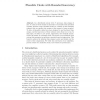13 search results - page 1 / 3 » Bounded concurrent timestamp systems using vector clocks |
JACM
2002
13 years 5 months ago
2002
Abstract. Shared registers are basic objects used as communication mediums in asynchronous concurrent computation. A concurrent timestamp system is a higher typed communication obj...
WDAG
2005
Springer
13 years 11 months ago
2005
Springer
In a distributed system with N processes, time stamps of size N (such as vector clocks) are necessary to accurately track potential causality between events. Plausible clocks are a...
PODC
1997
ACM
13 years 10 months ago
1997
ACM
Thispaperdescribesanewschemeforguaranteeingthattransactions in a client/server system observe consistent state while they are running. The scheme is presented in conjunction with ...
IPL
1998
13 years 5 months ago
1998
Vector timestamps provide a way of recording the causal relationships between events in a distributed computation. We draw attention to a limitation of such timestamps when used t...
ISTCS
1992
Springer
13 years 9 months ago
1992
Springer
Concurrent Time-stamp Systems (ctss) allow processes to temporally order concurrent events in an asynchronous shared memorysystem, a powerful tool for concurrency control, serving...

